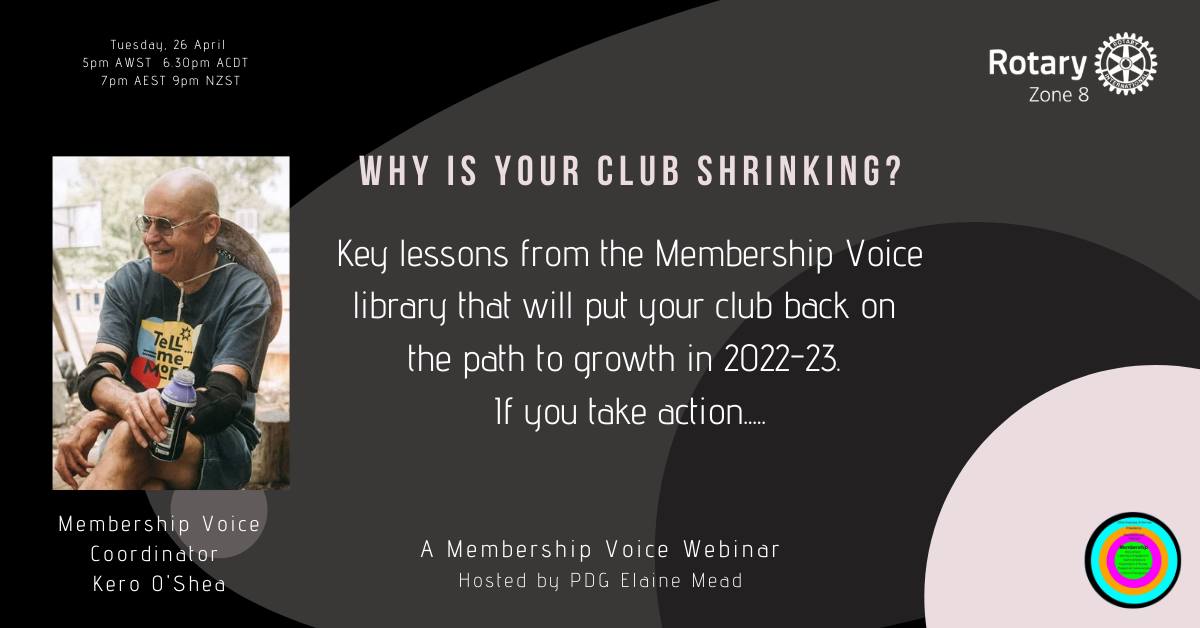
This was the topic of an address given last week by Kero O’Shea, who now heads up Rotary Australia’s Membership team.
It was very thought provoking, highlighting the unfortunate truth that declining Rotary Club member numbers is widespread, and the combined ‘we Rotarians’ must take action in order to reverse the trend.
We only need to look locally:
In its better years, Applecross had around 50 on the books, as did Melville, and talking with the active Canning RC, they are down from around 30 to the high teens!
Other Clubs have either folded, or under pressure to do so, or combine with a neighbouring RC.
Mind you, there is always the individual Club, that for its own reasons and efforts, has gone against the broader trend. Can they hold this position?
Also, it is not by accident that in 2023 we will only have 1 Rotary District in WA!
Kero’s address should be compulsory viewing for us all, and I will highlight a few of his points.( we don’t have to agree, but should consider key points)
1. We need to review what Rotary means in todays world, and strive to create a MODERN ROTARY, and TAKE ACTION!
Traditionally, Rotary was largely a Business leaders organization, with an emphasis on creating networking associations with likeminded, community interested folk… mainly MEN!
For the vast majority of Clubs, this no longer applies, as they truly struggle to be relevance identified, from a Membership viewpoint, within their communities.
ESSENTIAL: INVEST IN YOUR CLUB and its community relevance.
2. Clubs MUST resolve any conflicts within their group: unresolved it destroys the Club.
(Always important to ensure consensus rules, and m/ship is kept informed!)
3. Cost of Belonging.
A $300 average annual ‘cost of belonging’, as a volunteer, is seen as a hurdle to new members joining, with approx $180 of it going towards RI fees.
What was once the Rotary ‘Exclusive Club’ view no longer exists, and can now be viewed as a ‘tax on membership’!
Club fees charged are against the Club, and not the individual Member, and it makes sense for the Club to find ways to reduce its Member costs.
NFP organisations have an ‘accepted’ 15% cost base.. We, at Member level, pay 100% of the fixed costs of belonging.
For Example: Rockingham RC, as I understand, has annual dues of around $100-150, and dedicate an event/s for ‘growing Rotary to better serve our community’, and retaining funds raised for that purpose.
We, and other Clubs, can explore means of reducing the ‘ cost of volunteering’ to its Members, and use this as a means of attracting and holding m/ship in these cash strapped days.
4. Put a significant community CAUSE behind any new m/ship actions.
Ballina in northern NSW was cited, where the Club took on a major community need to support reducing Domestic Violence. With Community and Police support, their m/ship has grown to OVER 90 Members!! The community became involved and Rotary was a real winner!
5. Utilise the Rotary Learning Centre as a resource. Kero stated that there is a direct correlation with improved m/ship where a Club promotes the resource, and its Members are thus better informed on the opportunities presented.
6. When working with our community to encourage an interest in the wonderful project work that we undertake, and then join with us as volunteers, we should not overlook the opportunity to form ‘other’ Rotary groups… Satellite ‘local interest’ clubs, Rotoract or School based Clubs. These are listed under the ‘parent’ Club.
The Question for AxR: what do we want to achieve with m/ship growth, what is our market, and how do we go about it.
We are holding a Membership Committee meeting following our Club meeting tomorrow, and our plan is to find solutions to this ‘common’ Rotary problem.
Please give this some thought and be prepared to support.
As AG, I do want to see this developed as a Zone project and it is listed for progress at our Zone meeting next week.
My thoughts, along with those presented recently, same topic….Kenn.
Membership Voice library is loaded with great examples of evidence-based successful club building, based on what successful clubs and districts do. In this webinar, I've distilled some of the key lessons from the library to share with you as you prepare for another Rotary year.
You CAN grow your club - if you act!
You CAN grow your club - if you act!